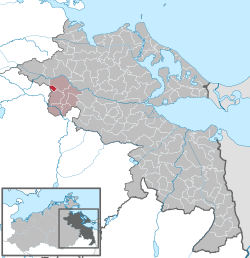
Leonding is a town southwest of Linz in the Austrian state of Upper Austria. It borders Puchenau and the river Danube in the north, Wilhering and Pasching in the west, Traun in the south and Linz in the east. Leonding is the most populous town of the Linz-Land district and the fourth most populous town in Upper Austria.

Braunau am Inn is a town in Upper Austria on the border with Germany. It is known for being the birthplace of Adolf Hitler.
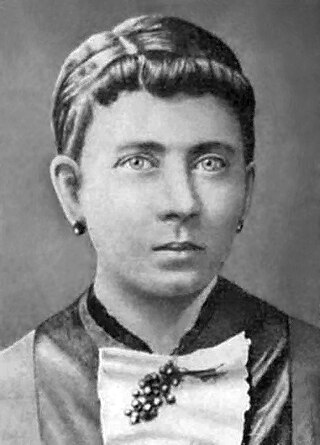
Klara Hitler was the mother of Adolf Hitler, dictator of Nazi Germany from 1933 to 1945. According to the family physician, Eduard Bloch, she was a quiet, sweet, and affectionate person. In 1934, Adolf Hitler honored his mother by naming a street in Passau after her.

Hermann Esser was an early member of the Nazi Party (NSDAP). A journalist, Esser was the editor of the Nazi paper, Völkischer Beobachter, a Propaganda Leader, and a Vice President of the Reichstag. In the early days of the party, he was a de facto deputy of Adolf Hitler. As one of Hitler's earliest followers and friends, he held influential positions in the party during the Weimar Republic, but increasingly lost influence during the Nazi era.

Albert Leo Schlageter was a German military officer who joined a right-wing Freikorps group after World War I and became famous for acts of post-war sabotage against French occupational forces. Schlageter was arrested for sabotaging a section of railroad track and executed by the French military. The manner of his death fostered an aura of martyrdom around him, which was cultivated by German nationalist groups, in particular the Nazi Party. In Nazi Germany, he was commemorated as a national hero.
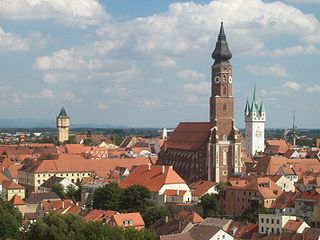
Straubing is an independent city in Lower Bavaria, southern Germany. It is seat of the district of Straubing-Bogen. Annually in August the Gäubodenvolksfest, the second largest fair in Bavaria, is held.
Hans Baumann was a German poet, songwriter, literary translator and author of children's books.

Veste Oberhaus is a fortress that was founded in 1219 and, for most of its time, was the stronghold of the Bishop of Passau, Germany. It is now the site of a museum, a youth hostel and a restaurant, as well as an open-air theatre dating to 1934.

Ybbs an der Donau is a town in Austria. It was established in 1317. Throughout the town, from the intersection of the important trade routes and along the Danube the town has preserved a site that already had great economic importance during the Middle Ages.

Otto Hellmuth was a member of the Nazi Party and the Gauleiter in Lower Franconia (Unterfranken) from 1928 to 1945.

Hauzenberg is a municipality in the district of Passau, in Bavaria, Germany. It is situated 15 kilometres northeast of Passau.
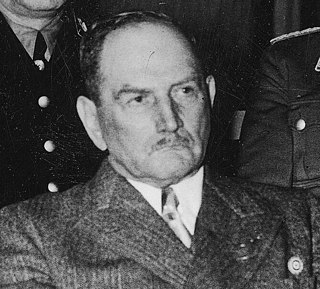
Franz Ritter von Epp was a German general and politician who started his military career in the Bavarian Army. Successful wartime military service earned him a knighthood in 1916. After the end of World War I and the dissolution of the German Empire, Epp was a commanding officer in the Freikorps and the Reichswehr. His unit, the Freikorps Epp, was responsible for numerous massacres during the crushing of the Bavarian Soviet Republic. He was a member of Bavarian People's Party, before joining the Nazi Party in 1928, when he was elected as a member of the German parliament or Reichstag, a position he held until the fall of Nazi Germany. He was the Reichskommissar, later Reichsstatthalter, for Bavaria, and a Reichsleiter of the Nazi Party. During the Nazi era, Epp, who had participated in the Herero and Namaqua genocide as a young man, shared responsibility for the liquidation of virtually all Bavarian Jews and Romas as the governor of Bavaria.

Haidmühle is a municipality in the district of Freyung-Grafenau in Bavaria in Germany.
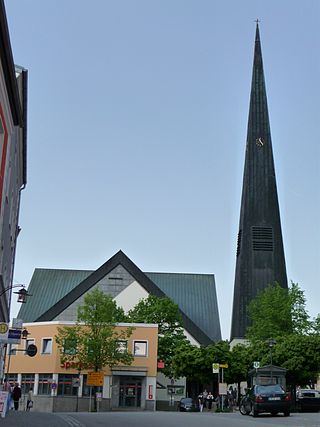
Wegscheid is a municipality in the district of Passau in Bavaria in Germany.
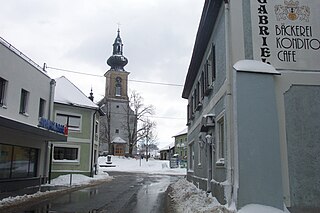
Kollerschlag is a municipality in the district of Rohrbach in the Austrian state of Upper Austria.

Schardenberg is a municipality in the district of Schärding in the Austrian state of Upper Austria.
Paul Laux was a German general in the Wehrmacht during World War II who commanded the 16th Army. He was a recipient of the Knight's Cross of the Iron Cross with Oak Leaves of Nazi Germany.
The Bund Deutscher Osten was an anti-Polish German Nazi organisation founded on 26 May 1933. The organisation was supported by the Nazi Party. The BDO was a national socialist version of the German Eastern Marches Society, which was closed down by the Nazis in 1934. It promulgated the idea of the "German East", an irredentist concept that attempted to deny the very existence of Poland and the Polish people's right to live there.

Fritz Wächtler was a Nazi Party official and politician who served as the Gauleiter of the eastern Bavarian administrative region of Gau Bayreuth. Trained as a primary school teacher, he also became head of the National Socialist Teachers League (NSLB) in 1935. During World War II he held the honorary rank of SS-Obergruppenführer and was the Reich Defense Commissioner of Gau Bayreuth. Prone to alcoholic outbursts and unpopular with the local residents, he eventually ran afoul of Martin Bormann in a political intrigue. Wächtler was executed on orders from Führer Headquarters near the end of the war on 19 April 1945.
Born in 1890, Oskar Walleck was a native of Brno.
